WEATHER MIX
Unit 4 TIME FOR OUTDOORS
Lesson 1 WEATHER MIX
VOCABULARY
1 Listen to the sounds. What images come to your mind? What is the weather like?
REMEMBER!
Sun – sunny
Wind – windy
Cloud – cloudy
Rain – rainy
Snow – snowy
Fog – foggy
Storm – stormy
VOCABULARY BOX
Chilly and foggy
Cloudy and snowy
Hot and sunny
Warm and sunny
Wet and rainy
2 Ask and answer in pairs. Use the pictures.
Example: A: What is the weather like in picture 1?
B: It is chilly and foggy.
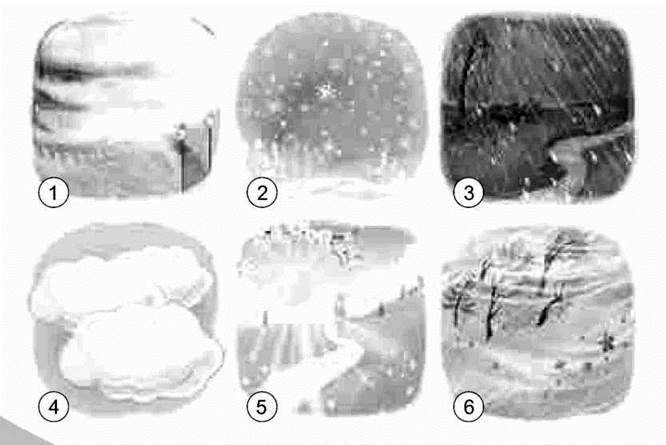
3 Make up true sentences.
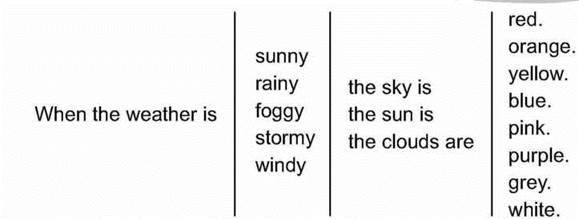
READING
1 a) Look at the symbols, use the words from the box and fill in the first gaps about the weather.
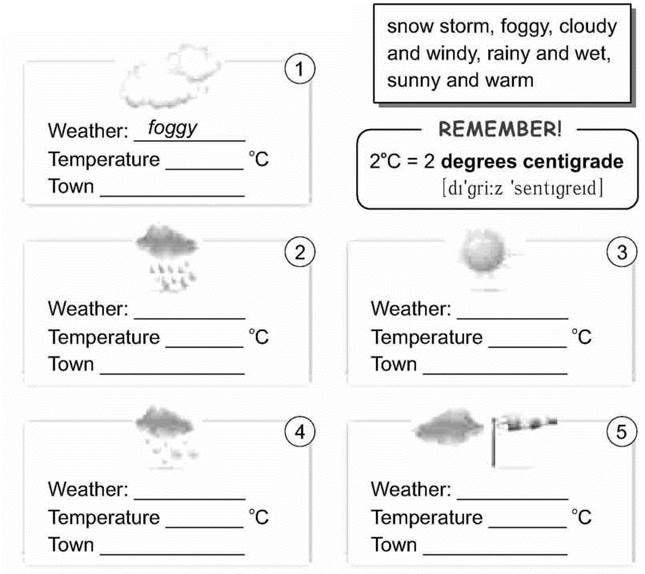
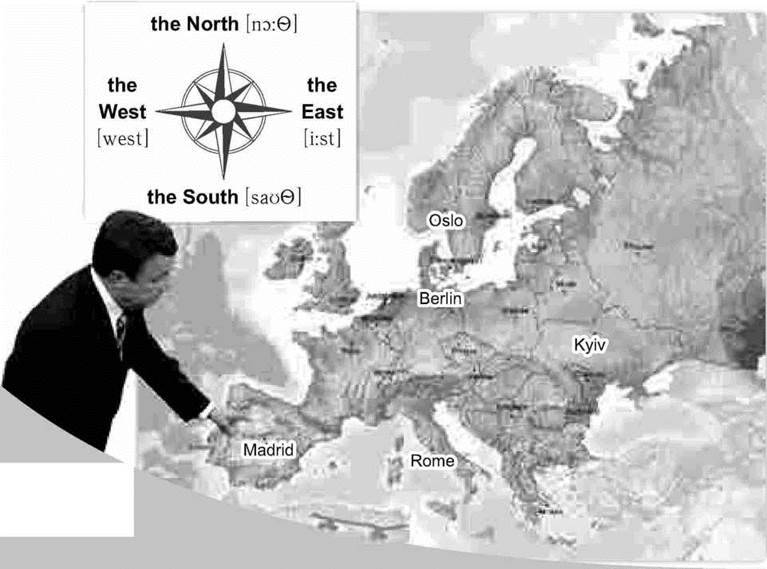
B) Listen and read the weather report and fill in the gaps above (a) with the temperature and the name of the town.
This is the weather report for our continent – dear old Europe. Yesterday was not different from the rest of the week. In the north it was cold as usual. In the south it was warm as can be expected for this time of the year.
London was foggy with a temperature of 12 degrees centigrade.
It was windy and cloudy in Berlin. And the temperature was 9 degrees centigrade.
In Madrid it was rainy again. Usually wet for this time of the year. And the temperature was 15 degrees centigrade.
Let’s see what the weather was like farther south. So, in Rome the weather was really beautiful. It was sunny and warm and the temperature was wonderful – 22 degrees centigrade.
The north of our continent was the coldest. Actually, it was even colder than usual. In Oslo the temperature was only 0 degrees and there was even a snow storm.
And now let’s see what the weather will be tomorrow…
2 Ask and answer in pairs.
–
– What is the weather like today?
– What was the weather like yesterday (last Sunday) / two days ago?
3 a) Read Pam’s letter to Taras and say what it is about.
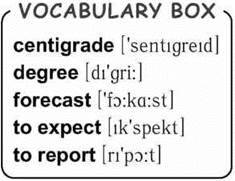
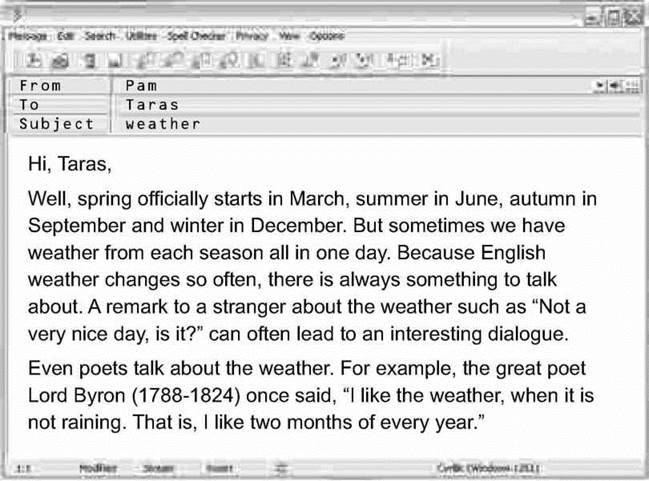
B) Answer the questions.
– When does summer officially start and finish in Britain?
– Why do people in Britain talk about the weather a lot?
– How can you start a talk with a stranger?
– Which months do you think the great poet Lord Byron liked best?
GRAMMAR
REMEMBER!
It is + Adjective / Noun
It is cold. It is winter. It is light.
It is warm. It is dark. It is Sunday morning.
1 Think about spring and autumn and make up 5 sentences from the table below.

REMEMBER!
To rain, to snow
PRESENT SIMPLE
It often rains / snows in autumn.
It never rains / snows there.
It doesn’t rain / snow in June.
Does it often rain I snow there?
PRESENT CONTINUOUS
It is raining / snowing now.
It isn’t raining I snowing now.
Is it raining / snowing now?
PAST SIMPLE
It often rained / snowed last winter.
It didn’t rain / snow last month.
Did it rain / snow in March?
2 Write down questions and start them with the words in brackets.
It often rains in autumn in Kyiv. (When / Where)
It never snows in Africa. (Does / Where)
It usually rains in October. (When / Does)
3 a) Write questions to interview your British friend about the weather in Great Britain. Work in a group,
B) Compare your list with the lists of other groups. Which one is the longest/the most correct?
LISTENING
1 Listen and say why the weather is different in various places.
Let’s see what the weather is like around the world today.
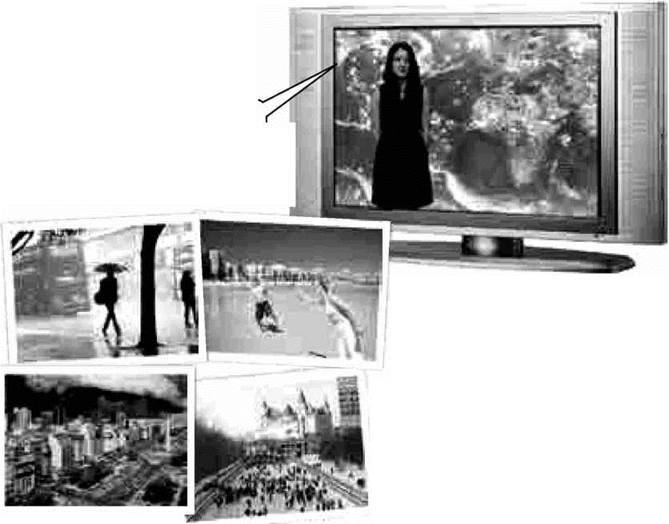
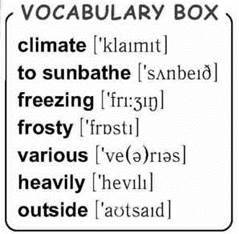
2 Listen again and answer the questions.
1 What are people in England doing?
2 What’s the weather like in Argentina today?
3 In which country are people swimming today?
4 What’s the weather like in Canada today / on February, 8th?
3 Read and answer the questions below.
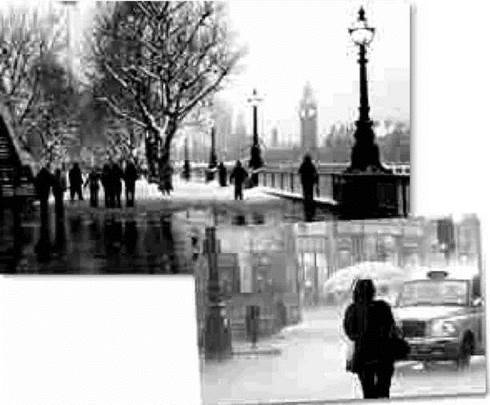
WINTER IN ENGLAND
The weather in England is not very cold. Sometimes it snows. But usually it rains in winter. That is why Englishmen usually don’t wear warm coats. They have got raincoats and umbrellas.
1 Is the weather usually very cold in England in winter?
2 Does it often snow?
3 What do Englishmen usually wear in winter? Why?
4 a) Complete the table with the words from the box.
Cold, hot, very cold, very warm, warm

B) Look, then ask and answer in pairs. Use the words above.
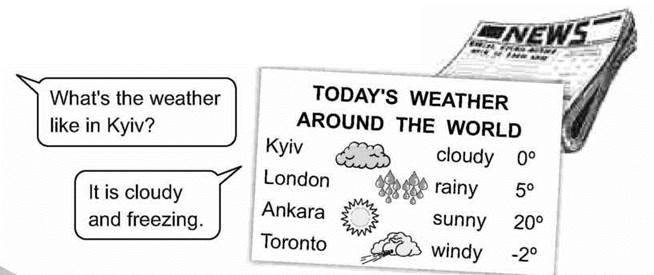
5 Listen and sing the song.
Falling from the sky,
Soft and white,
Falling through the air
Day and night,
Cold and bright,
Pretty sight,
Snow, snow, snow!
At last we know
It’s snow, snow, snow!
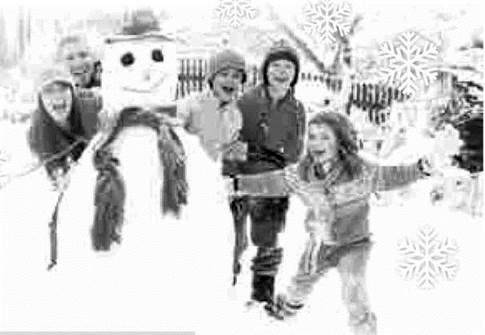
SPEAKING
1 Speak about the day during your last holiday. Use the questions below.
– Where were you?
– When were you there?
– What was the weather like?
– What were other people doing?
– What was your favourite activity?
2 Read the postcards and look at the information below. Guess where these people are. Discuss in a group,
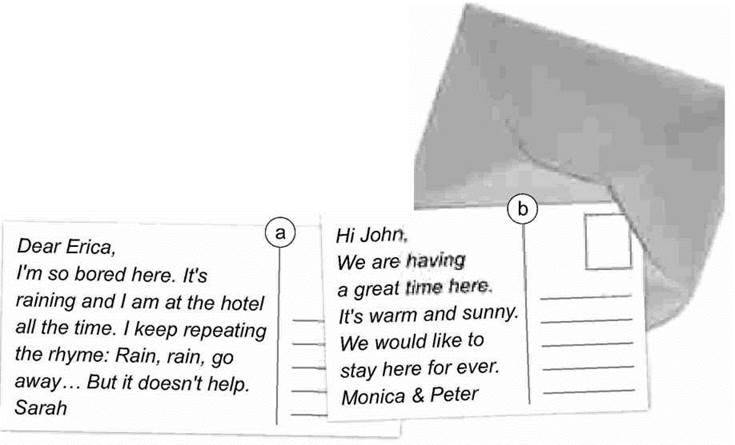
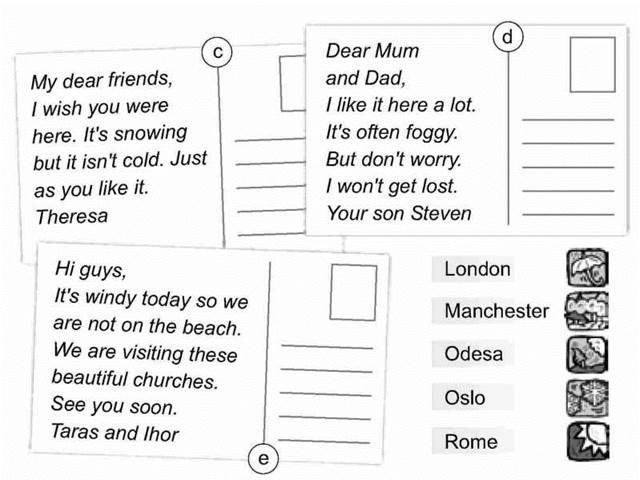
3 Listen, read and act out the talk in a group of three.
Jane Shsh! Let’s listen about the weather.
Speaker; It is going to be snowy tomorrow. The weather is going to be cold and frosty in London. Be careful! It’s going to be slippery in the city.
Моthег. What do they say about the weather, Jane?
Jane: They say we must put our warm clothes on.
Mother: Really?
Jane: Yes, it is going to be frosty and slippery tomorrow.
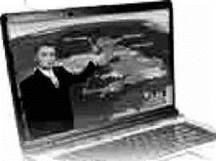
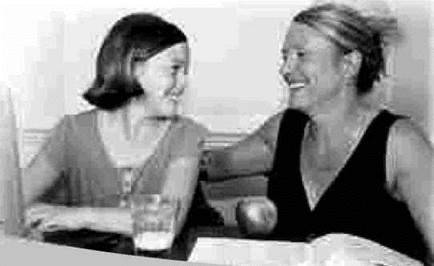
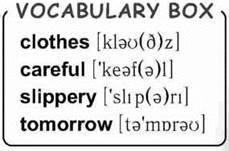
4 Look and say as in the example.
Example: It’s going to be foggy in France tomorrow.
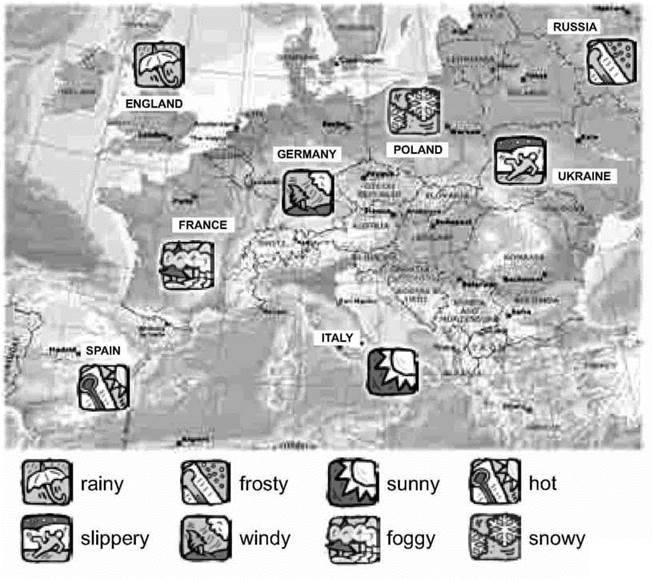
5 Read and say where Ann’s father is and what the weather is there.
Father: Hello, Ann!
Ann: Is it you, daddy?
Father: Yes, I am. How are you?
Ann: I am fine. Where are you now, daddy?
Father: I am in Italy today. It is sunny and warm here. What is the weather like in London?
Ann: The weather is bad. The wind is blowing today. It is cool and wet.
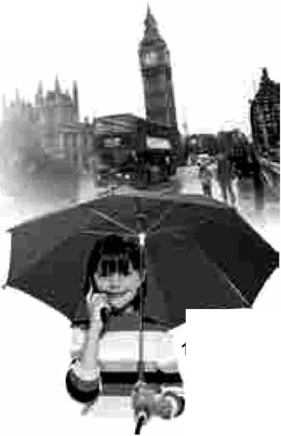

6 Role-play the situation.
Use the words from the box.
A and В are classmates.
A is in London now.
В is talking over the phone and asking about the weather.
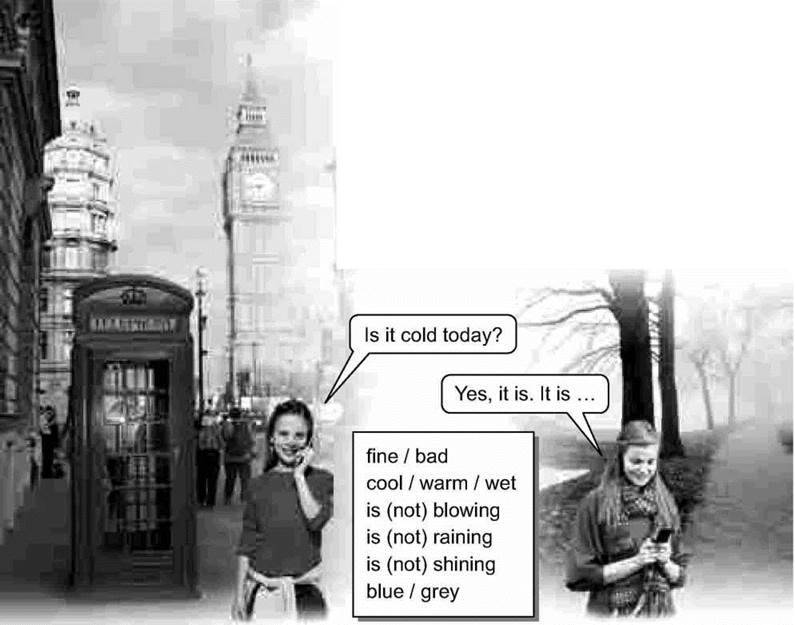
WRITING
1 Make your weather report. Copy and complete the table.
– What was the weather like in your town / village?
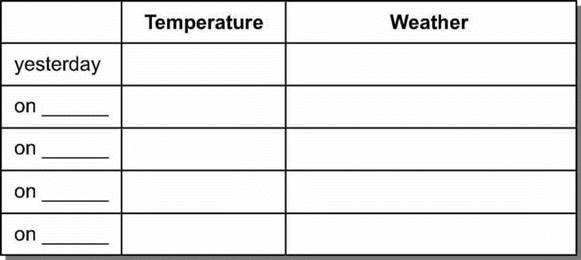
2 a) Put the verbs in brackets into the Present Continuous to complete the e-mail.
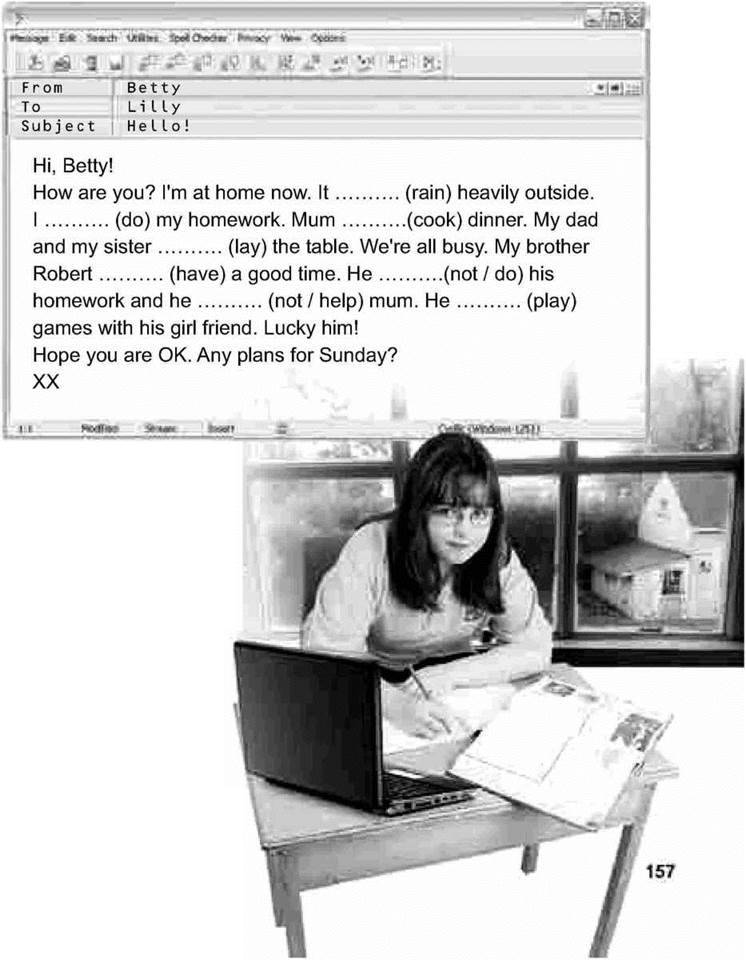
B) Write an e-mail to a friend similar to the one above. Use the questions below.
– What is the weather like in your town / village today?
– What are you doing?
– What are others doing?